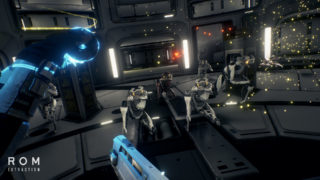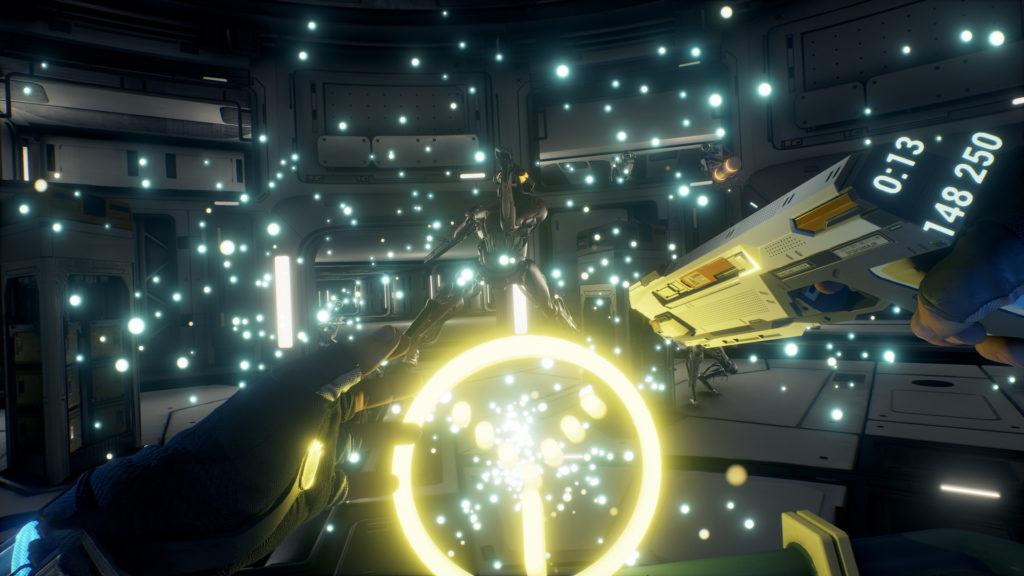First Contact is a virtual reality game studio founded by video game industry veterans from Starbreeze, Robotoki, Blizzard, Treyarch, Infinity Ward, SCEA and Spark. They were joined in October by VRLA co-founder Jessica Ward—who oversees the company’s relationships with VR and gaming communities—and former Skybound Interactive executive producer, Matthew Candler, who now serves as First Contact’s chief revenue officer.
Its first game, ROM: Extraction, released earlier this month for HTC Vive and Oculus Rift on Steam, and a PlayStation VR (PSVR) launch is expected in the near future. Speaking with [a]listdaily, Candler describes the game as an endless arcade shooter, where players are challenged to take out as many enemies as possible in three minutes using orbs that explode when shot.
“ROM is set in the near future, where we’re extracting minerals from the moon,” said Candler. “On a production level, it was one of those things where the programming team was playing around with different mechanics and found a fun one that involved throwing and shooting. Everyone who tried it thought it was really fun, so the mechanic came together in about the span of a week. We saw it, thought it was fun, and said, ‘let’s get it to marketing and have the company go through a production release process.’ Then we could iron out the kinks of launching content and publishing it on Steam, Oculus (Oculus Store) and PSVR (PlayStation Store). So, it came from this fun game mechanic and a desire to go through a product release to learn how to develop and launch, since as a team, we hadn’t done it yet.”
ROM: Extraction may seem pretty straightforward right now, but First Contact intends to update the game with additional levels, weapons and enemies. “We want people on the market to understand that we’re going to continue to support the game and integrate features into the product,” Candler explained. “We think that the publishing landscape [for VR] is still very new, and we’re trying to be smart by not making too many large commitments.”
 In discussing how the First Contact team came together, Candler spoke about how he worked with three of its founders on The Walking Dead VR Experience, a fan experience featured at Walker Stalker Con, while at Skybound. It was in 2015 that Starbreeze made a pivot into the VR space, and the developers learned that they had a knack for it, so they decided to start their own studio. “They had about two years of experience in VR and decided that they wanted to work on multiple platforms, so they went out and raised some money,” said Candler. At around the same time, Candler thought, “wow, this is a great time to jump into VR” and decided to join them.
In discussing how the First Contact team came together, Candler spoke about how he worked with three of its founders on The Walking Dead VR Experience, a fan experience featured at Walker Stalker Con, while at Skybound. It was in 2015 that Starbreeze made a pivot into the VR space, and the developers learned that they had a knack for it, so they decided to start their own studio. “They had about two years of experience in VR and decided that they wanted to work on multiple platforms, so they went out and raised some money,” said Candler. At around the same time, Candler thought, “wow, this is a great time to jump into VR” and decided to join them.
Virtual reality is still in its early phases, which makes game promotion challenging, but Candler believes that livestreaming and video content play an important role in promoting new games.
“You have a limited amount of hardware out, but more hardware is coming into the market, so that’s good,” said Candler. “There are fewer participants in VR compared to people streaming traditional PC and console games. It (livestreaming) is a fairly new part of the business and it’s a very powerful way to market a product—having a lot of videos and content created by streamers.
“The other thing is that we’re starting to see that mixed reality is starting to become the preferred way of showing video. The person who is playing the VR game actually looks like they’re in the experience.”
Although mixed reality livestreams are preferred by viewers, Candler explained that there are some technical hurdles, and First Contact is coordinating with the Unreal Engine team to overcome the challenges. “We have a very short development cycle,” said Candler, “so implementing and updating mixed reality is something that we’re getting to—it’s just taking us a little bit longer.”
In the meantime, First Contact intends to keep ROM: Extraction growing and evolving with fresh content. “We’re going to add multiplayer, more weapons, more enemies, and we’re developing two new levels,” Candler said. “We will announce those levels and when they’re going to launch in short order, in the New Year. I think with VR, being nimble is helpful, given how things are kind of in flux across the market.”
When asked about how First Contact was working with partners to raise awareness about the game, Candler said: “Steam has been great, and all the guys over there have been really exceptional and supportive. We got some time in at the Steam Dev Days with demo windows. The hardware partners have been great; both HTC and Oculus have been fantastic and Sony has been very supportive. There are some things coming up that we’re going to announce soon, and our hardware partners will help us promote the product. Our strategy is to work with those people to create a symbiotic relationship between hardware and software and help drive consumer adoption.”
Candler also noted how ROM players were already picking up a strong sense of competition in climbing the leaderboards. With Oculus working to promote The Unspoken as a VR eSport, we asked Candler about his thoughts on eSports support for ROM.
“We hear a lot about eSports,” he responded. “My personal opinion is that there are a few dominant players, and if a product organically evolves into one, that would be wonderful. It’s not something we’re targeting, but we are working with location-based entertainment places, so there’s a lot of opportunity there. If the game evolves in that direction—if that’s what the fans want—then I think we’ll be ready to support it. But it’s not something that we’re saying is a definite thing, because I don’t think there are quite enough units out there for anyone to take a definitive direction.”
When Candler was asked about what he thought was needed to help grow VR adoption, he said: “I think it needs awesome content. Our main goal for ROM, and the reason we launched it, was to get more people experiencing good VR content. We were doing a lot of demos of the product, and we wanted to get it out there to have people experience it.”
Candler also believes that, in addition to location-based demos, retail spaces will play a strong role in getting consumers to adopt VR.
“A great way to sell content is to have people go to an experience and say, ‘I want that,’” said Candler. “That’s what we’re seeing with ROM, where people will come in, play the game, and say, ‘Wow, how do I get that in my home?’”

